
The Business Owners I work with are passionate about their companies, having invested years of blood, sweat and tears into them. To a point where the owner and their company are indistinguishable from each other.
So, is it reasonable to expect employees to think about your company and results in the same way you do when they have their own hopes, dreams and desires?
Your employees’ level of commitment and motivation is linked to whether their personal goals and values align with those of the company, relative to their perception of the situation and the action required of them.
There are two types of action required of an employee.
Tasks they like doing and tasks they don’t. Those we enjoy tend to come pre-loaded with motivation and aren’t a problem unless something else affects our performance.
Motivation can dry up when it is time to engage in actions that are undesired or perceived to be complicated. In these cases, we are challenged to do what needs to be done against our preferences.
I personally find having meaningful and even tricky conversations effortless. On the contrary, I find accessing the motivation to write these blogs and their accompanying videos profoundly challenging. It is easy for me to find other things to do instead of these tasks.
Motivation is not a prerequisite for action in any situation.
As my mentor says, “I don’t give a f&ck about your state of mind. When shits got to be done, it’s got to be done”.
For people to overcome the pull of procrastination and avoidance, they need to master recognising the signals in their own systems and develop skilful ways to:
· frame and execute complex tasks in ways that align with their preferences
· get complex tasks done despite their preferences
· prioritise on importance rather than preference
It is essential to understand that personal growth, probably the most significant source of motivation and satisfaction, only occurs after undertaking challenging tasks that we thought were beyond us. In other words, motivation is often found after action than before it.
